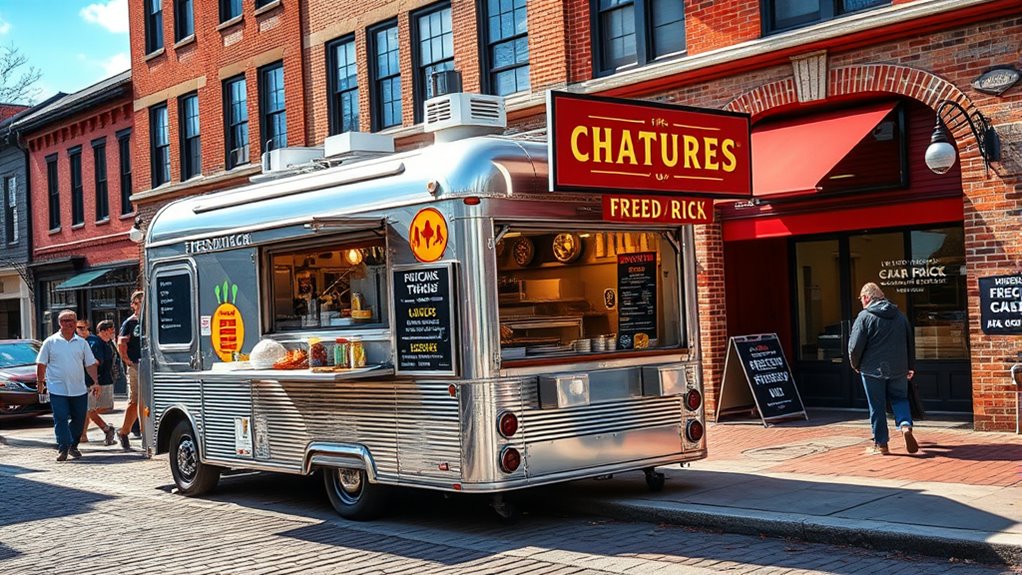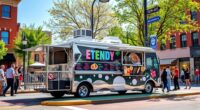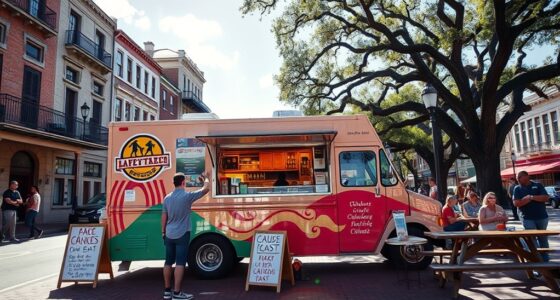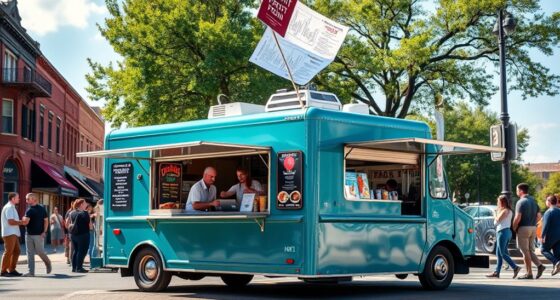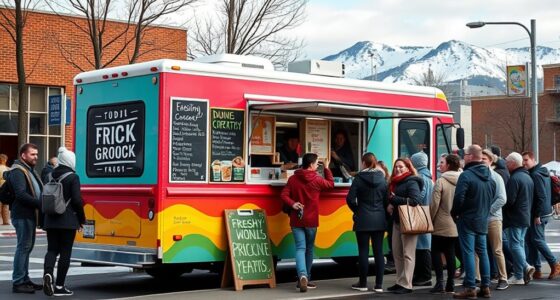To open a food truck in Frederick, Maryland, you’ll need to secure permits like a Mobile Food Service Facility Permit, a Food Truck License, and a Vendor’s Permit, along with fire safety approval. Budget around $40,000 to $150,000 for the truck, equipment, and initial stock, plus monthly expenses for fuel, maintenance, and staff. Find strategic locations near breweries or transit stations, design a safe, compliant menu, and develop strong marketing. Keep exploring to learn how to navigate these steps smoothly.
Key Takeaways
- Obtain necessary permits including Mobile Food Service Facility, Food Truck License, Vendor’s Permit, and fire safety approval from local authorities.
- Budget $40,000–$150,000 for truck purchase and $1,100–$2,000 monthly for operating expenses.
- Operate on private properties with owner permission and avoid the Historic District, targeting breweries, wineries, and train stations.
- Develop a food-safe menu using approved suppliers, proper storage, and HACCP practices to ensure compliance.
- Build a strong brand with signage, participate in local festivals, and use guerrilla marketing to attract customers.
Navigating Permit Requirements and Inspection Processes
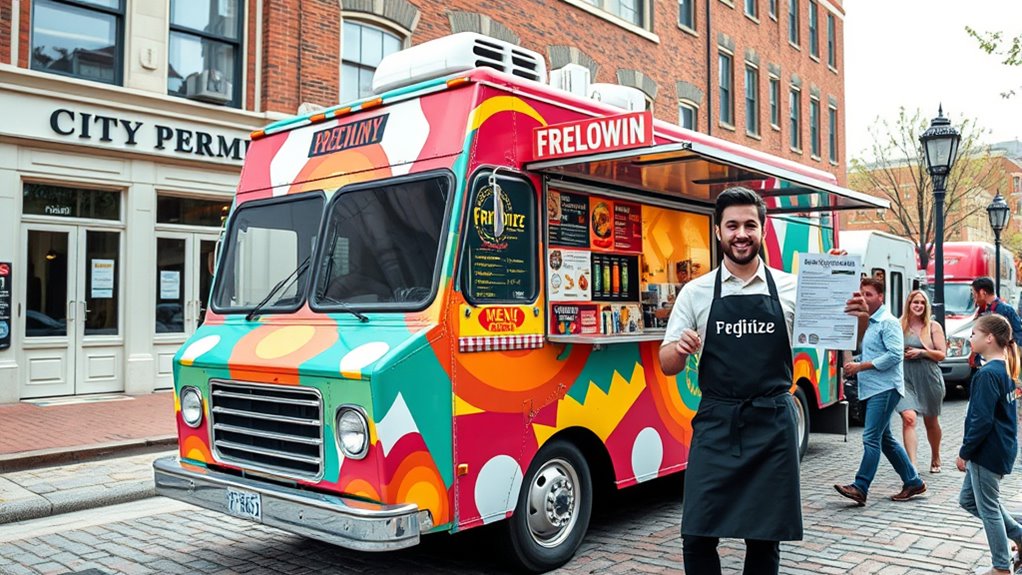
Managing the permit requirements and inspection processes for operating a food truck in Frederick, MD, can seem complex, but understanding the essential steps makes the process smoother. First, you need a Mobile Food Service Facility Permit, which requires submitting unit details and your commissary information through the local health department. You’ll also need a Food Truck License, possibly including a Mobile Reciprocity License if you plan to operate across counties. A Vendor’s Permit from the Department of Permitting Services is necessary for sales, and fire safety approval from the Fire Marshal is mandatory, costing $50 annually. Additionally, if you’ll participate in events, secure the appropriate Special Event Permits. Ensuring your vehicle and plans meet all requirements helps streamline inspections and keeps your operation compliant. Plans review process ensures compliance with health and safety standards, which can help prevent delays during inspections. Considering the reliability of your equipment can also impact your compliance and efficiency during inspections.
Understanding Costs and Budgeting for Your Food Truck Venture
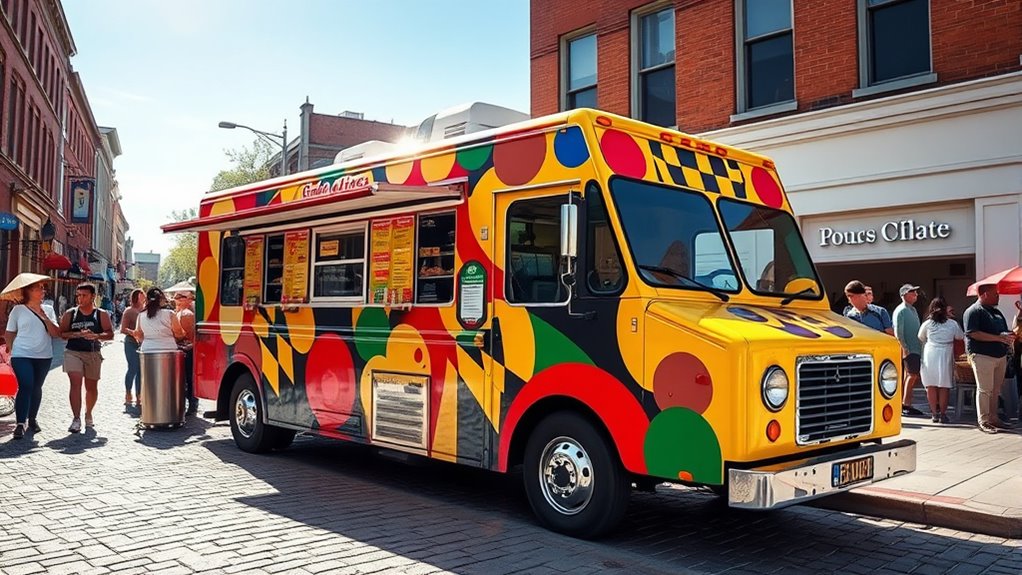
Starting a food truck business requires careful planning around costs and budgeting to guarantee long-term success. Your initial investment for a truck ranges from $40,000 to $150,000, depending on whether it’s new or used and customized. Kitchen equipment like grills and refrigeration can be included or purchased separately. Expect to spend $2,000 to $3,000 on inventory before opening, plus about $300 on serveware and disposables. Monthly costs for fuel, maintenance, and insurance can total $1,100 to $2,000. Weekly ingredient expenses might exceed $1,000, with labor costs varying based on staff size. It’s wise to double conservative estimates for unexpected expenses and seasonal fluctuations. Budgeting for growth, marketing, and local licensing—typically $1,800 to $3,000—is essential to maintain steady operations and profitability. Understanding local permit requirements can help prevent costly delays or fines. Additionally, researching initial startup costs such as licensing fees and equipment upgrades can better prepare you for the financial commitment involved.
Locating Strategic Parking and Operational Zones in Frederick
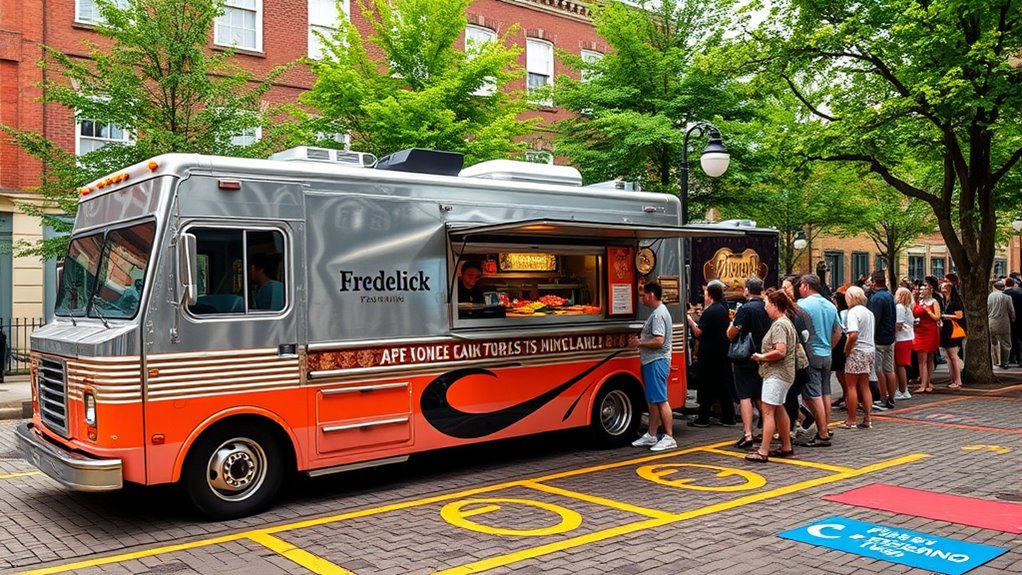
Choosing the right parking and operational zones in Frederick can profoundly impact your food truck’s visibility and customer flow. You can operate on private non-residential properties with owner permission from 9:00 AM to 9:00 PM daily, and in residential neighborhoods from 10:00 AM to 8:00 PM, with a five-day limit on the same block. Avoid the Historic District, except Carroll Creek Park, and target locations near breweries, wineries, and distilleries. The MARC Train Station is also an approved spot. Guarantee your truck maintains at least 10 feet clearance from buildings and other vehicles, and avoid blocking emergency exits or fire lanes. Securing private property permissions and adhering to fire safety standards are essential for smooth, compliant operations in strategic zones. Changes to operation hours and permitted locations should be closely monitored to ensure compliance and avoid potential violations. Additionally, understanding local zoning regulations and permitting procedures can help prevent future legal issues and fines.
Developing a Food Safe Menu and Ensuring Compliance
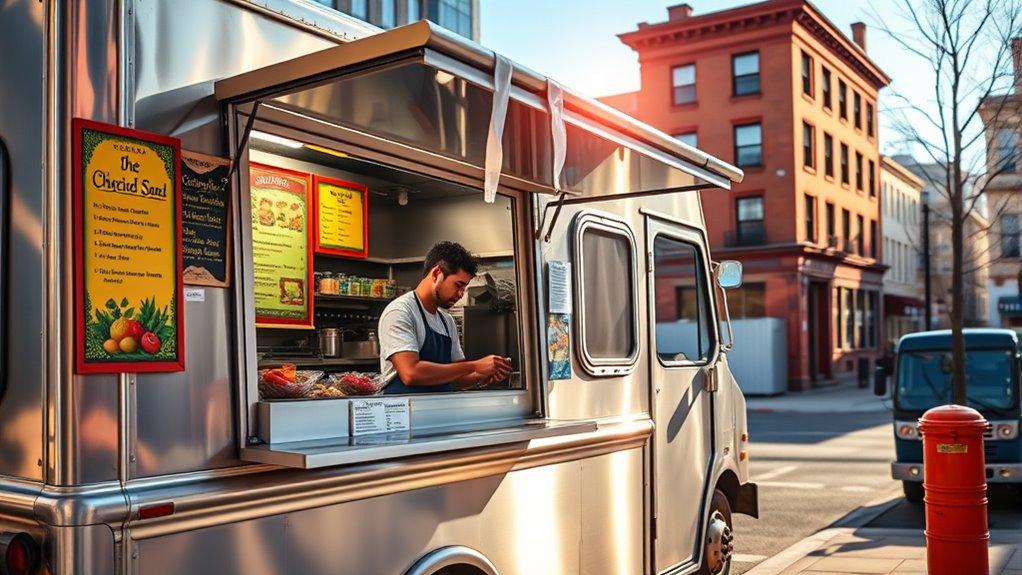
Developing a food-safe menu for your food truck requires careful planning to guarantee compliance with Maryland health regulations. You must source ingredients from approved suppliers and obtain permits for potentially hazardous foods, following HACCP protocols to manage safety risks. Design your menu considering limited space, avoiding complex prep steps that increase contamination. Prepackaged non-hazardous foods may need fewer permits but still require adherence to regulations. Incorporate refrigerated and dry storage areas to maintain ingredient safety. Additionally, understanding filter replacement frequency and maintenance is essential to ensure ongoing food safety and equipment efficiency.
Marketing Strategies and Participating in Local Events
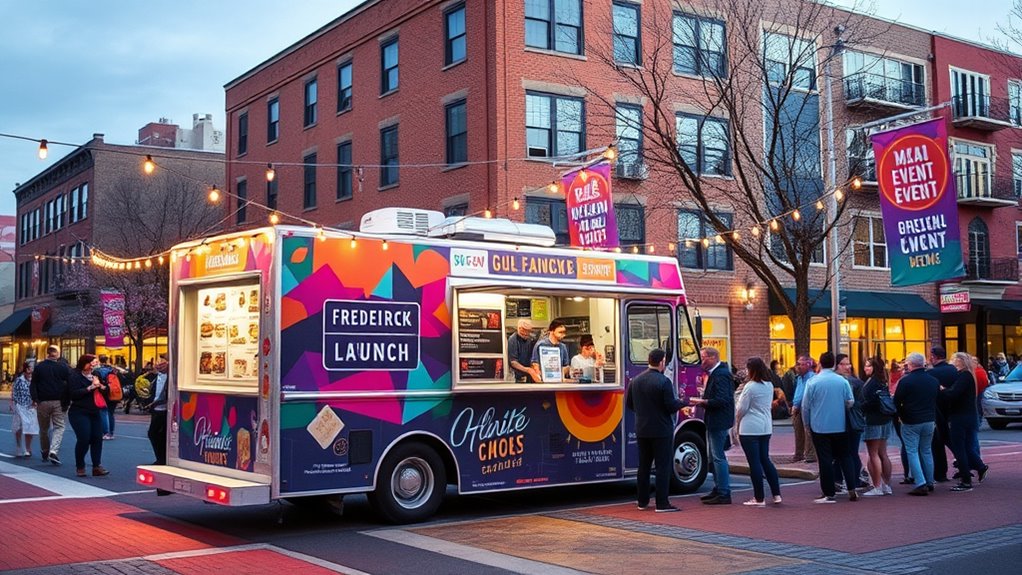
Effective marketing for your food truck hinges on creating a strong brand identity and engaging with your community through local events. To stand out, develop a consistent, memorable visual identity with a unique logo, vibrant wraps, and clear signage. Use branded packaging and merchandise to boost recognition and encourage social sharing. Participating in local festivals and events allows you to connect directly with your target audience and increase visibility. Consider these strategies:
- Align menu specials with local festivals to maximize foot traffic and media coverage.
- Offer event-specific discounts or contests to foster customer interaction.
- Leverage guerrilla marketing, like street art near event venues, to visually engage passersby.
- Incorporate anime-inspired branding to appeal to diverse customer interests and stand out from competitors.
Implementing these tactics helps build brand loyalty and expands your reach in Frederick’s vibrant community.
Frequently Asked Questions
Are There Any Grants or Financial Assistance Programs Available for New Food Truck Owners?
Yes, you have several grant options in Frederick, Maryland. The ACCESS GRANTED program offers $400,000 for small businesses, prioritizing women and minority owners, though competition is fierce. You can also explore regional tourism grants like TRIPP for marketing support, or partner with nonprofits that receive community foundation grants. Keep an eye on city and county announcements, as new funding rounds often open annually or biannually to help new business owners like you.
How Do I Find Approved Vending Locations and Obtain Necessary Permits for Each?
Finding approved vending locations is like steering a map with clear landmarks. You should check Frederick’s designated areas, such as Carroll Creek Park or MARC Station, and stay away from restricted zones like the Historic District. Then, you’ll need to obtain permits from the Fire Marshal and Health Department, ensuring your truck meets safety and health standards. Always coordinate with local authorities to secure the necessary approvals for each specific spot.
What Are the Most Common Compliance Violations to Avoid During Inspections?
You want to avoid common compliance violations during inspections, so verify your fire safety measures are up to code with proper fire suppression and clear emergency exits. Maintain food at safe temperatures, avoid cross-contamination, and store everything hygienically. Keep your mobile unit clean, provide handwashing facilities, and operate with valid permits and documentation. Regularly inspect equipment, follow sanitation protocols, and stay updated on local regulations to pass inspections smoothly.
Can I Sell Alcohol or Beverages From My Food Truck in Frederick?
Think of selling alcohol from your food truck like steering through a busy street—every move must be precise and legal. In Frederick, you can sell beverages if you obtain the proper permits, including a liquor license from the Frederick County Liquor Board. You’ll need to follow strict rules on hours, alcohol types, and staff training. Without these steps, you risk fines or shutdowns, so stay compliant to keep your journey smooth.
What Insurance Coverage Is Recommended for Food Truck Operations in Maryland?
For your Maryland food truck, you should get commercial auto insurance to meet legal requirements and cover your vehicle. Add general liability to protect against accidents and product liability for food-related claims. Consider equipment breakdown, business interruption, and workers’ comp if you hire staff. To enhance protection, think about cyber liability, damage to rented property, and inland marine insurance. Tailor your coverage with an experienced agent to balance costs and risks effectively.
Conclusion
Starting your food truck in Frederick isn’t just about permits and locations—it’s about embracing the city’s vibrant community. As you navigate inspections and craft your menu, you might find yourself at the perfect event or spot just when it’s needed most. With a little planning and a dash of luck, your venture will seamlessly blend into Frederick’s lively food scene, turning every coincidence into an opportunity for success.
